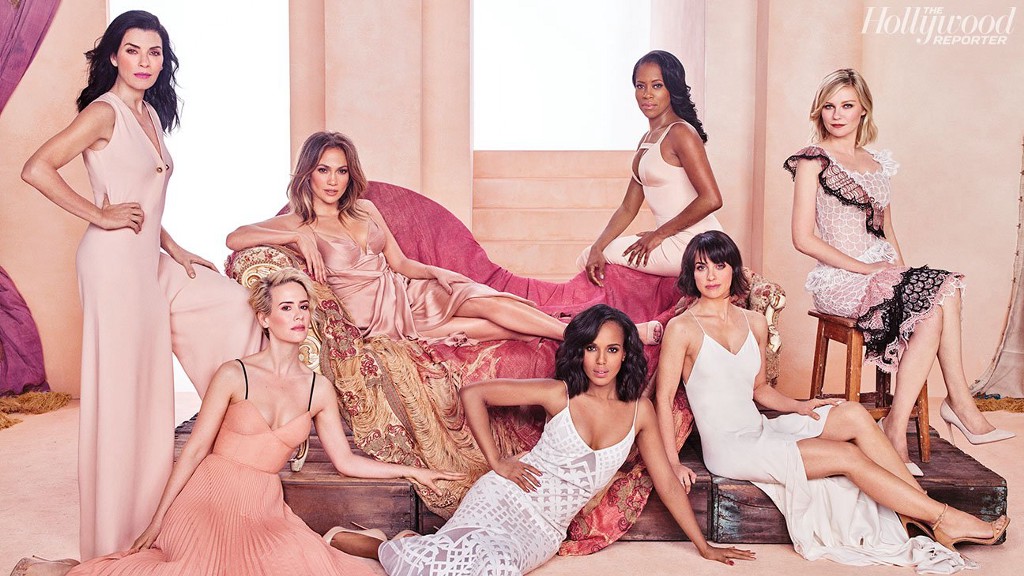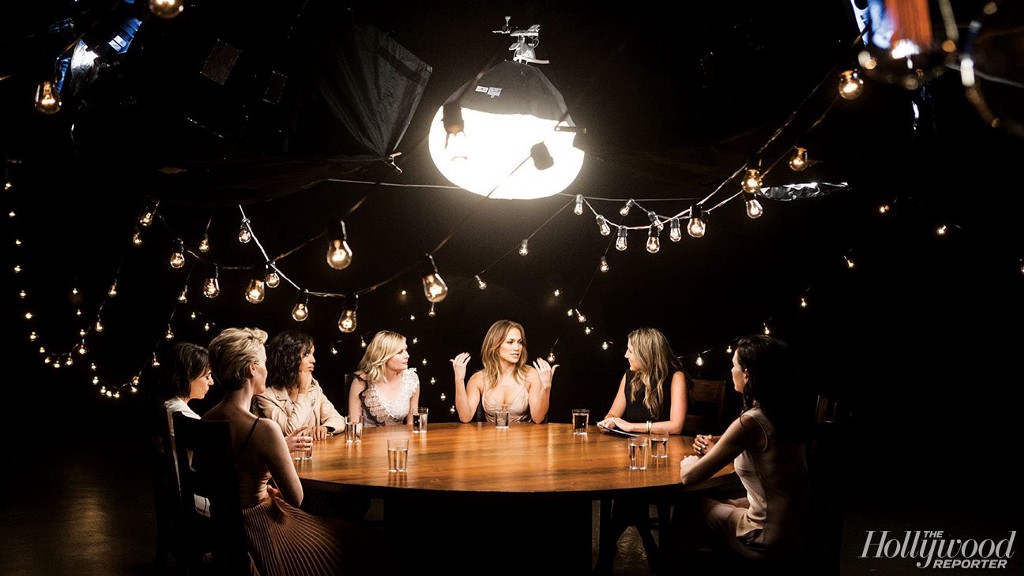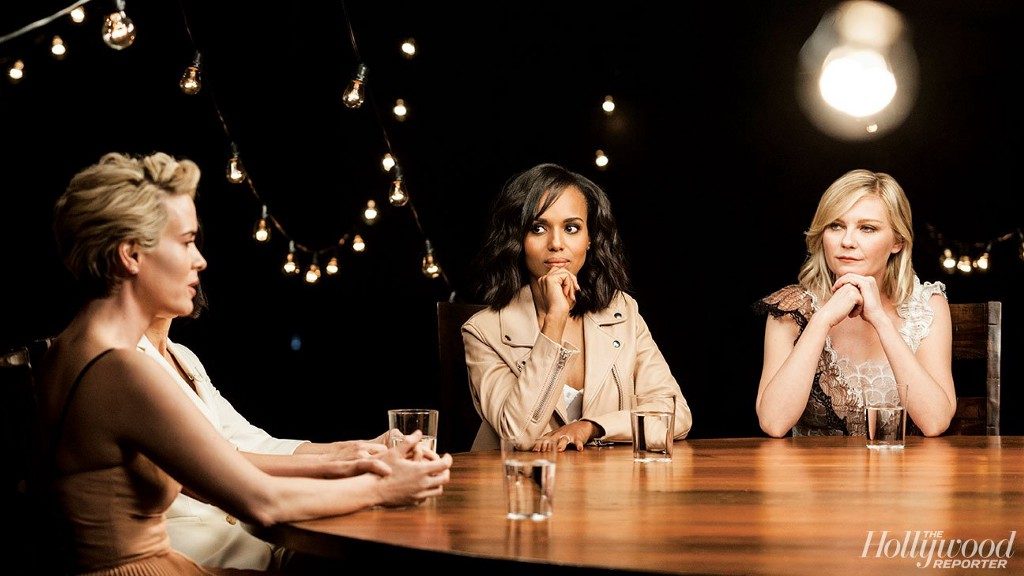Kerry Washington, Julianna Margulies, Sarah Paulson, and More Women of TV Talk Sexism on THR’s Roundtable

The Hollywood Reporter has put together another top-notch roundtable. In anticipation of the upcoming Emmy Awards and nominations, THR gathered seven powerhouse women of television to sit and chat about sexism in the industry, their characters and shows, and the scenes they actually had to call their lawyers before shooting.
Julianna Margulies (“The Good Wife”), Jennifer Lopez (NBC’s “Shades of Blue”), Sarah Paulson (FX’s “The People v. O.J. Simpson: American Crime Story,” “American Horror Story: Hotel”), Kirsten Dunst (FX’s “Fargo”), Regina King (ABC’s “American Crime,” HBO’s “The Leftovers”), Kerry Washington (ABC’s “Scandal,” HBO’s “Confirmation”), and Constance Zimmer (Lifetime’s “UnREAL”) sat down for for a candid conversation. Here are a few highlights. For the entire interview, head to THR.
On sexism:
THR asked, “As actresses, what have been the most overtly sexist things you’ve experienced in your careers?”
Washington replied, “I’m in this very surreal environment right now having Shonda Rhimes as my boss, where it’s almost the opposite. It is specified in scripts that guys take their shirts off all the time… The guys are naked all the time! And she has said to all the women on the show: ‘You want to do a love scene in a parka? You just let me know.’ So it’s this weird, like, reparations moment where the girls get to do what they want to do and the guys get to do what they want to do, but they know what Shonda wants them to do.”
Zimmer has the luck of being on a female-friendly set as well. “On ‘UnREAL,’ we have two female leads, female showrunners and writers, and it’s very driven toward us being empowered, which is definitely different. We can treat the men a bit like how we may have been treated earlier in our careers or just as women in general. It’s fun to watch the tables be turned and to see the guys on set eating lettuce.”
Paulson detailed how she’s never been asked to play a romantic leading lady without having to go blonde. “I don’t mind it, I like the blond — but to be told that in order to be considered a romantic lady opposite some hunky guy, I need to have long blond hair that looked very ‘L.A. Real Housewives’? It does do something to your brain. You go, ‘Gosh, so the way I came into the world is not as appealing as it would be if I were altered in some way?’ That’s a funny message to extend to a person. And that’s the other thing: I did it. I put the extensions in, I blonded it up.”
Lopez discussed how she’s been given a label she feels is undeserved — and sexist. “I’ve always been fascinated by how much more well-behaved we have to be than men. I got a moniker of being ‘the diva,’ which I never felt I deserved — which I don’t deserve — because I’ve always been a hard worker, on time, doing what I’m supposed to do, and getting that label because you reach a certain amount of success … Or even sometimes I felt crippled to voice my opinion, especially because certain directors and the boys’ club that they form can make you feel like, Oh, I can’t say anything. I was always fascinated by how I could see [a man] being late or being belligerent to a crew and it being totally acceptable; meanwhile, I’d show up 15 minutes late and be berated. And you watch this happen over and over and over again. Like, we’re not allowed to have certain opinions or even be passionate about something, or they’ll be like, ‘God, she’s really difficult.’ It’s like, ‘Am I? Am I difficult because I care?’”

On producing:
THR brought up the fact that Julia Louis-Dreyfus had to fight to get a producing credit on her television shows and asked, “Are those things you felt you had to fight for, and, if so, is gender a factor?”
Margulies didn’t have to fight with her show, but did with the PGA. “I didn’t have to fight to get it from my showrunners; they were thrilled because the writers room was in Los Angeles so I was their eyes on set. It was the Producers Guild that gave me a hard time. To try to prove my job to them in order for them to accept me as a producer? I still don’t think I’m in the Producers Guild, and it’s been three years. And I can’t tell you what I do as a producer on that show and the fires I put out. I’ll see something happening, and I’ll immediately turn off my actor hat and go, ‘OK, this isn’t going to work for you, let’s figure it out.’ But they send you lists to fill out. ‘Are you a part of the budget? Are you a part of the … ?’ And I go, ‘Well, no, because that was already in place, but I do this, this and this.’ None of that’s on there at all, and so they call it a vanity title, which is incredibly insulting.”
Washington fought for “Confirmation,” but lets “Scandal” slide. “It’s something I made a choice not to fight for at ‘Scandal ’ because I really like the dynamics of our cast and the way we interact with the writers and producers as is, and I didn’t feel like it was something that I needed there. But ‘Confirmation ’was a different story because I was part of that from the very beginning, before we had a script. I was on as an executive producer, and I said to my co-producers, ‘If you want me on as a vanity producer, I’m not interested in doing this project with you. I have real opinions and passionate ideas about how this is supposed to go.’”
On nudity:
THR brought up last year’s roundtable where Maggie Gyllenhaal mentioned that nudity had become more appealing to her as she aged. They asked, “Are there parts you won’t play or lines you won’t cross as performers?”
Lopez said she’d done enough of that earlier in her career. “It’s the opposite for me once I had kids. In videos and things that I do, I’m very sexy and wear little clothes, but the truth is, when it comes to acting, I did it earlier in my career and now I just don’t feel sometimes that you have to do it. I’ve changed in that sense.”
Zimmer explained that, “Saying no before the opportunity comes means you won’t get the opportunity, so I tend to like to say: ‘Show it to me. If I can figure out a way to make it work, I’ll always try.’ I mean, I’m not necessarily spreading my legs in front of a camera. I guess there’s my line.
King added, “But sometimes you already have the job and the nudity conversation didn’t come up until a couple seasons in. And then you get that script and go, ‘Whoa, oh, hmm …’ (Mimics dialing her lawyer). The particular situation that I’m thinking of [on ‘Southland’], I didn’t feel like [the scene] was honest to the character: If Lydia was going to have sex, I just didn’t see her having sex like that. And they got it. They were respectful.”
Dunst unsurprisingly capped off the topic by saying, “I’m pretty much down for anything if the director is good. (Laughs.)”







